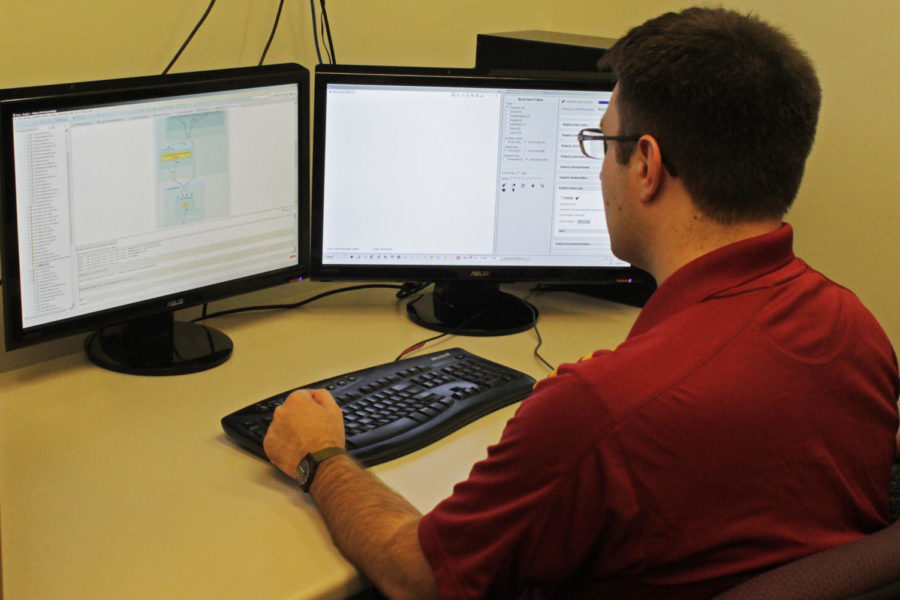ISU team works to prevent military smartphone sabotage
Kelby Wingert/Iowa State Daily
Ben Holland, research associate, works on a program that detects malicious behaviors in software as part of a three-phase project Iowa State is doing for the military to prevent smartphone sabotage.
April 10, 2014
As technology continues to advance every day, so does the opportunity for that technology to come under attack. An ISU professor and his team are working on developing technology that will prevent and combat those attacks.
A team led by Suraj Kothari, professor of electrical and computer engineering, is currently working in conjunction with his company, EnSoft Corp., an Ames-based company, to develop technology for the Department of Defense.
“The Department of Defense is very concerned about software sabotage,” Kothari said.
The Defense Advanced Research Projects Agency, a part of the DOD, was created to fund research and projects that prevent negative technological surprises that could impact national security.
Kothari and his team are developing software analysis technology funded by the agency through the automated program analysis for cybersecurity program.
“Problems with the Internet of someone hacking into a computer and stealing files has been around for a long time, but now they are worried about a new wave of more sophisticated attacks,” Kothari said.
These attacks, Kothari said, could happen to the software in hidden computers — computers that exist everywhere but are not visible, such as nuclear reactors, missiles, cars and mobile phones.
Although there are many different types of attacks, Kothari said that the DOD is concerned particularly about the attacks to apps on military smartphones.
Through this $4.9 million research project, Iowa State is being funded to develop technology that can look into apps on smartphones and identify possible problem areas.
“In order to trust a system, you really have to understand it deeply and then verify that the behaviors in the system are the ones that you want,” said Thomas Deering, graduate student in electrical and computer engineering and graduate research assistant on the software development team.
The project was not only given to Iowa State. There are seven different teams currently developing a software analysis platform through this three-phase project.
In the 18-month first phase, the technology was developed and then challenged through provided malicious apps.
In this phase, the ISU team was named as having the top performing software, based on the time and accuracy of the technology.
“One of the reasons why I think we are doing so well is because our approach fits the problem, which is that we are constantly thinking about the human aspect of the software,” Deering said.
Currently in the 18-month second phase, the teams will look at the potential of the technology by testing it with harder challenges and making sure the technology can adapt to the situation.
The third phase will be implementating the technology and commercially transferring it to the DOD.
“Phase three is when the tools that they think are useful or have promise start getting polished for deployment,” Deering said.
At the end of the project, the software that lasted the best will be used to analyze military smartphones and any applications they may use to ensure the phones are secure.
Kothari said the software chosen will be based mainly on how easy it to use.
“There are limitless possibilities of ways technology can be attacked, so the question is, ‘How easy can the technology developed adapt to identify those attacks?’” Kothari said.
For the ISU team, they are all really enjoying the project.
“It’s a lot of fun working because you get to think like a horrible person without being a horrible person because that’s the only way to create successful technology for the project,” Deering said.
For Kothari, having Iowa State’s graduate students and his EnSoft Corp. employees work together has been his favorite part.
“[On this project,] we are competing with some of the top people in the world and we’re able to do so well because of the team,” Kothari said. “We have very intelligent people who all work really well together.”
While the project should be completed in 2015, Kothari said that acquiring government-funded research like this will only benefit Iowa State.
“If we start and continue to get more projects like this, then more people will come to Iowa State wanting to work on this type of cutting edge technology, which will only make Iowa State better,” Kothari said.

















